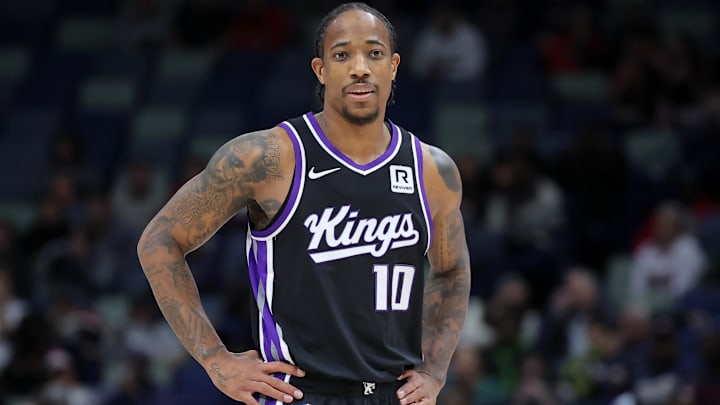This week, the Sacramento Kings captured attention by dismissing 2022-23 NBA Coach of the Year Mike Brown, following a disappointing beginning to the 2024-25 season.
With DeMar DeRozan brought in to make a lasting impact, fans expected a revitalized team vying for a playoff spot. However, instead of soaring towards victory, the Kings floundered near the bottom of the Western Conference standings, leaving the crowd scratching their heads and questioning the franchise’s decision-making process.
DeMar DeRozan adds star power but not the right fit for Sacramento
When Sacramento acquired DeRozan, they likely envisioned a seasoned player who could elevate their performance. After all, who wouldn’t want a crafty scorer with a pedigree like his? But as the team’s early struggles suggested, the reality is that DeRozan’s style of play doesn’t mesh well with the Kings’ existing roster.
Known for his adept ball-handling and mid-range mastery, the veteran’s limitations—especially his inability to shoot the three-ball and his reputation as a liability on defense—have created unexpected tension in a lineup that already had established stars like De’Aaron Fox and Domantas Sabonis.
Raptors fans are all too familiar with this narrative. DeRozan shone as Toronto’s golden boy for years but ultimately failed to carry the team over the playoff hump, especially against formidable foes like LeBron James.
His ability to score is undeniable, but the franchise learned the hard way that relying heavily on a player with singular strengths can often render a team stagnant—especially in high-stakes playoff scenarios.
DeRozan's hurdles in Toronto should've warned the Sacramento Kings
DeMar DeRozan's impressive scoring ability has been a highlight of the Kings' offense, but it also limits their overall potential. By relying heavily on his individual production, Sacramento's offense can become stagnant and predictable, making it easier for defenses to prepare and adapt.
This one-dimensional approach can be a liability in the playoffs, where teams are better equipped to contain top scorers and force other teams to adjust their game plan. Of course, the Kings’ struggles can’t solely hinge on DeRozan’s shoulders. A greater chunk of the blame lies with the front office.
The management failed to grasp that a championship-caliber team requires an ecosystem—comprised of quality role players and strong defenders—surrounding star talent. In a league where versatility and defense are paramount, Sacramento’s roster needs to prioritize players who fit their dynamic needs rather than simply stacking star talent.
Consider that Sabonis already faces questions about his defensive prowess in the paint, making adding another defensive liability like DeRozan a recipe for an identity crisis.
While Kevin Huerter and Keegan Murray were once heralded as sharpshooters, their struggles from three-point range this season have added to the Kings’ dilemmas. This dip in shooting has forced the team to confront their inconsistent offense, making it clear that they need to develop better strategies that can elevate both their scoring and defense.
Let’s not forget DeRozan’s journey since leaving Toronto, where he expanded his game during stints with the San Antonio Spurs and Chicago Bulls. He undoubtedly evolved into a better playmaker, adding dimensions to his skill set that were missing during his Raptors tenure.
Nevertheless, one cannot dismiss the truth: at heart, DeRozan remains the inline scorer he has always been, as unwilling to adapt defensively as he is keen to flaunt his mid-range fundamentals.
So, what does this mean for Kings fans? Well, they might have started to sense the problem before it became glaringly obvious. Raptors fans, on the other hand, could have told them that adding DeRozan wouldn’t magically solve their issues.
Instead of boosting Sacramento’s position in the standings, his presence has exposed a significant flaw: the Kings need to rethink their roster strategy. Quality defense and shooting are essential, and simply stacking star names won’t bring the success they crave. It’s a lesson that should have been learned—and avoided—by now.
